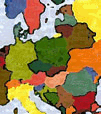A nation ablaze
Forest fires—the primary news story of the summer—seem to be dying out this week after the nation has been gripped by appalling forest fires since the heat wave that paralysed the Balkans at the beginning of July.
In the central and southern Prilep and Bitola regions, this is an annual phenomenon that wreaks environmental and agricultural havoc, but this year has seen the mountains ablaze in the north-western Tetovo region, including the Šar mountain range which borders Kosovo.
To date, there have been no official estimates for the total damage caused, but the fires are believed to have severely harmed the nation's already weak economy
Many of the fires are in inaccessible mountain regions and can be dealt with only by locals and, in particularly severe cases, helicopters from a Polish KFOR unit have assisted by dropping water. In more accessible areas, the blazes have been tackled by the combined strength of the police force, the fire brigade, local citizens and the Macedonian Army.
The battle was clearly won by nature, and started to subside only when temperatures began to fall early last week.
Election fever (part I)
Macedonians go to the polls 10 September to elect municipal mayors and councils, while Skopje residents will also elect a city mayor and council. A second round of balloting will follow on 24 September if necessary.
A source at the Organization for Security and Cooperation in Europe's ODIHR reports that, to date, the primary complaint heard by election monitors centres on the scarce or non-existent nature of municipal funding for the elections. Under a relatively new law, the financial burden of local elections has been placed on the municipalities themselves, rather than central government.
Other than that, election preparations appear to be progressing relatively smoothly. Vital statistics for the election are as follows.
Criteria (number)
Eligible voters—1,634,859
Polling Stations—2973
Municipalities—123
Of which Skopje has....
Eligible voters—384,377
Polling Stations—498
Municipalities—7
Largest Municipality
Kisela Voda (Skopje):
Eligible voters—102,983
Polling Stations—142
Smallest Municipality (polling stations)
Blatec & Vevčani (village municipalities):
Polling Stations—3
Smallest Municipality (voters)
Konopište:
Eligible Voters—492
Largest Polling Station
Kumanovo:
Eligible Voters—1427
Smallest Polling Station
Osinčani:
Eligible Voters—4
Election fever (part II)
The upcoming local elections seem to have been born out of the embers of the forest fires. With the first round scheduled for Sunday, 10 September, elections seem to have inherited the column inches only recently vacated by stories of the forest fires.
In an already hysterical national press, there have been no actual political fires, but plenty of vociferous smouldering.
VMRO-VMRO vs VMRO-DPMNE
The VMRO-VMRO party has preoccupied much of the media this week and last, ensuring that observers have had to be very careful in drawing the distinction between this party and VMRO-DPMNE, the dominant partner in the governing coalition.
The first "VMRO" in the VMRO-VMRO stands for "Internal Macedonian Revolutionary Organisation," and was the name of a party associated with the national Illinden uprising against the Turks in 1903. It is, consequently, a popular appellation for political parties in Macedonia. The second "VMRO" in the party's name stands for "True Macedonian Reform Option." A relatively new party, the VMRO-VMRO was formed eighteen months ago from and for disillusioned members of VMRO-DPMNE who accuse the government of betraying its reform commitments.
Although they call themselves the "true" VMRO, the vast majority of the VMRO-VRMO's policies are the same as those of the VMRO-DPMNE, and the newest party's emergence seems to be more a matter of personal incompatibility than a genuine political rift.
The past week saw a great deal of friction between the two VMROs.
At a press conference, VMRO-VMRO leader Boris Stojmenov announced that, for the past two weeks, the homes of MPs who had recently defected to the party from VMRO-DPMNE had been virtually sieged by demonstrators shouting abuse and throwing tomatoes.
The situation became more serious at the Skopje home of MP Georgi Todorov. According to the MP's own account, he fired two shots into the air to frighten the demonstrators. However, police sources have said two demonstrators were wounded at the scene, and ballistics tests show the bullets to have come from a gun registered to the Todorov.
Meanwhile, the state taxation department has commenced a "thorough" audit of holding company "BS" —registered to party leader Stojmenov—and the public prosecutor has raised a case against deputy leader Boris Zmejkovski related to possible insurance fraud.
For the leadership of VMRO-VMRO, it has been a busy week.
Georgievski moving against media?
On 30 August, the financial assets of the newspapers Makedonija Denes, and Denes, owned by the same publishing house, were frozen after they refused to pay taxes they described as "outrageous."
The taxes were imposed in the wake of a highly unflattering article on Prime Minister Ljubčo Georgievski's wife in Makedonija Denes, accusing her of stealing money from humanitarian funds administered by her NGO Blagovestie.
Both papers have drawn a direct link between this article and their tax bill.
On the following day, the cover of Makedonija Denes showed a photo of Georgievski, computer generated into a military dictator, resplendent with uniform. The paper's leader column made a confusing yet defiant statement, saying first that the freezing of assets would probably mean that this issue would "be the last for some time," then immediately concluding "but we won't give up, we will continue to publish as normal."
Macedonia will have to wait and see.
Eleanor Pritchard, 2 September 2000
Moving on:
- Archive of Macedonian news reviews
- Browse through the CER eBookstore for electronic books
- Return to CER front page
Sources:
Macedonian Language:
Start—weekly magazine
Forum—fortnightly magazine
Dnevnik—daily
Vecer—daily
A1 TV
Albanian Language:
Fakti
Flaka
MTV




